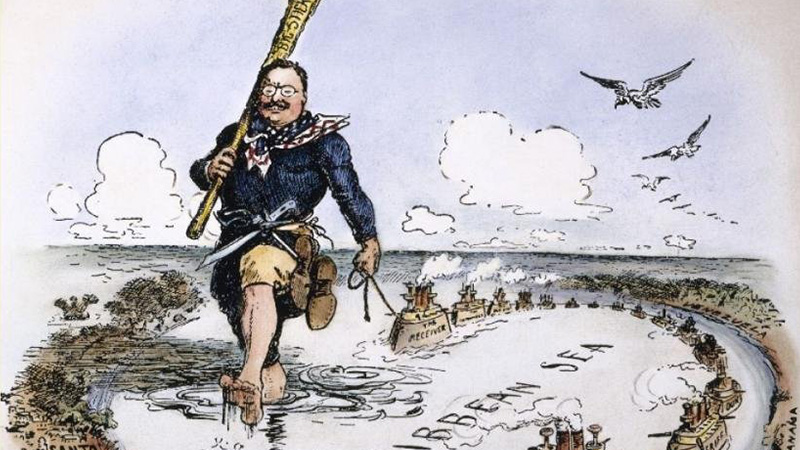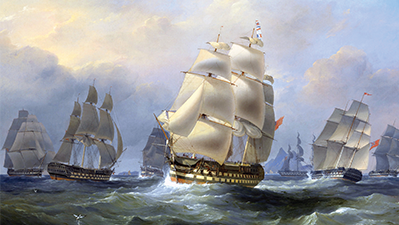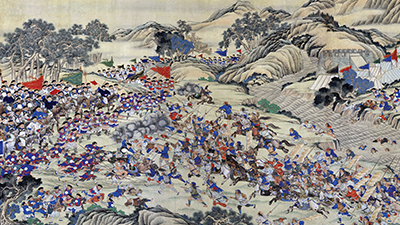Economic Imperialism from 1750 to 1900 CE
Driving Question: How did various European nations and United States interests gain economic advantages in Latin America and Asia during this period?
Industrialized nations during the long nineteenth century organized trade in ways that helped them dominate the global economy, often at the expense of smaller, less industrialized countries. This was particularly true in Asia and Latin America.
Learning Objectives:
- Explain how various economic factors contributed to the development of the global economy from 1750 to 1900.
- Use the historical thinking of contextualization to evaluate the Opium Wars.
Vocab Terms:
- ambassador
- economic imperialism
- indirect control
- isolationism
- modernization
- reparations
Opener: Economic Imperialism
To teach this lesson step, refer to page 3 of the Lesson 6.5 Teaching Guide.
Economic imperialism led to shifts in global power. Use your image analysis skills to predict what some of these shifts might have looked like.
Economic Imperialism in Latin America
To teach this lesson step, refer to page 3 of the Lesson 6.5 Teaching Guide.
Foreign investment seemed like a great way to boost the economies of newly independent nations in Latin America, but this investment came at a steep cost.
-
Guiding Questions
-
Before you read
Preview the questions below, and then skim the article. Be sure to look at the section headings and any images.
While you read
Look for answers to these questions:
- How was guano used in the nineteenth-century economic imperialist ambitions of both the US and Great Britain?
- What is the difference between settler colonialism, formal colonialism, and economic imperialism?
- Why was Great Britain one of the first industrialized nations to successfully use economic imperialism in Latin America? What nation soon eclipsed Great Britain’s dominance in Latin America?
- Why did Latin American leaders and businesses accept foreign investment and trade treaties?
- What are two examples of foreign investment in Latin America?
After you read
Respond to these questions:
- What are some examples of economic imperialism in today’s world?
- How did economic factors contribute to the development of the global economy from c. 1750 to 1900?
Contextualization: Opium Wars
To teach this lesson step, refer to page 3 of the Lesson 6.5 Teaching Guide.
Students need feedback to learn—use the Contextualization Feedback Form to help students reflect and improve upon their contextualization skills.
To appreciate the details, you must first understand the big picture. This skill is called contextualization, and you will use it to understand the Opium Wars.
Opium Wars and Economic Imperialism
To teach this lesson step, refer to page 6 of the Lesson 6.5 Teaching Guide.
The Opium Wars were a heavyweight fight between the British Empire and Qing Dynasty China. The results changed the global economy forever.
-
Guiding Questions
-
Before you read
Preview the questions below, and then skim the article. Be sure to look at the section headings and any images.
While you read
Look for answers to these questions:
- How does the author define economic imperialism? Why did some empires use this method?
- Why was tea so important to the relationship between China and Britain?
- What did the British find to sell to Chinese consumers, and what did the Chinese government do in response?
- What caused the First Opium War?
- What is meant by the “unequal treaties” era?
After you read
Respond to the following question: Do you think the legacy of the Opium Wars is still important today? What’s one way in which this history might influence global affairs today?
Closer: Economic Imperialism
To teach this lesson step, refer to page 7 of the Lesson 6.5 Teaching Guide.
The Writing Guide is expansive and can help support students even with shorter writing tasks.
Newspaper headlines might be short, but that doesn’t mean they’re easy to write. Reflect on what you’ve learned in this lesson by crafting a headline—from the perspective of a Chinese reporter writing about the conflict.
Struggle and Transformation in China
To teach this lesson step, refer to page 7 of the Lesson 6.5 Teaching Guide.
Although China was not formally colonized, it still experienced significant outside interference in the shape of a more informal imperialism.
-
Guiding Questions
-
Before you read
Preview the questions below, and then skim the article. Be sure to look at the section headings and any images.
While you read
Look for answers to these questions:
- What were some internal divisions that the rulers of China were dealing with in the long nineteenth century?
- Why was China subject to unequal treaties in the nineteenth century?
- What was the Taiping Rebellion, and how did European and American soldiers participate in it?
- What was the goal of the Tongzhi Restoration?
- What led the Dowager Empress Cixi and Emperor Guangxu to institute the Hundred Days’ Reform?
After you read
Respond to the following questions:
- To what extent does this article explain how various economic factors contributed to the expansion of empires from 1750 to 1900?
- China was not formally colonized during this period, except for very small regions. In what ways did it experience imperialism?
- Should we regard the Qing rulers, especially the Dowager Empress Cixi, as defenders of China, or as imperialists themselves? Why? Is it possible to be both?






